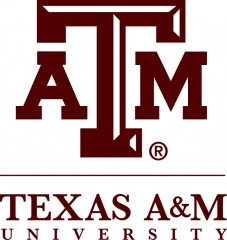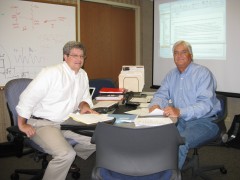- Directors’ Message: Value of TDL Software Development
- Development Update: PresNet and TxLOR
- Tech Teams Update
- Texas A&M support for grant seekers, data management
- New Resource: “Member Resources” page
- Training courses for February and March
- News Briefs: TTU wins award, Governing Board Meeting scheduled, OR11 conference dates
Directors’ Message: The value of TDL software development
Dear TDL members,
While the Texas Digital Library provides its member institutions with a suite of scholarly communications services today – things like institutional repositories and online journal management tools – it is also engaged in ongoing efforts to create future digital services that meet the consortium’s collective needs for digital publication and preservation.
These eventual new services are in the hands of the TDL’s software development team, a centralized development staff that works on behalf of the entire consortium to develop technologies that benefit our members and the future of Texas scholarship.
In a traditional model, each institution would staff its own software development shop and develop its own set of experts in isolation from other institutions. By drawing on the combined resources of our members, however, the TDL takes this burden off of each individual institution.
This centralized model provides for better allocation of resources by reducing duplication of efforts, creating a center for expertise around digital library technologies, and tackling large-scale projects that each member might not have the resources to accomplish on its own.
The benefits of this centralized approach are especially evident in the development of the TDL Preservation Network. Preservation of digital assets is a key concern of all our members, but creating a geographically dispersed network for long-term storage of fragile digital assets is a large and difficult endeavor that profits from cooperation and the pooling of resources.
You can read about the work our team has already accomplished on PresNet this year in the Development Update later in this newsletter. And as we build on this work to meet the collective business needs of our members, we keep in mind the ultimate goal of ensuring the future availability of digital scholarship produced at Texas colleges and universities.
Sincerely,
Mark McFarland and John Leggett
TDL Co-directors
Development Update: Progress on PresNet, TxLOR in early 2011
 The technical team employed by the TDL is a core part of the value that TDL provides to members. Working as a centralized development staff on behalf of the consortium, the team is working on technical projects that benefit all of the fifteen members of the TDL.
The technical team employed by the TDL is a core part of the value that TDL provides to members. Working as a centralized development staff on behalf of the consortium, the team is working on technical projects that benefit all of the fifteen members of the TDL.
Since the beginning of the year, the team has made significant progress on two key projects: the TDL Preservation Network and the Texas Learning Object Repository. It has also begun organizing work into one-week sprints (i.e. cycles) and holding public sprint reviews each Thursday afternoon, in an effort to foster an open atmosphere with TDL members about the team’s work.
TDL Preservation Network
TDL software developers began the year focused on the TDL Preservation Network. Currently, the PresNet is capable of packaging and delivering all TDL-hosted digital assets to a dark archive at the Texas Advanced Computing Center, which replicates and stores the data with its partners at geographically dispersed locations.
The TDL team has been adding more sophisticated harvesting and scheduling functionality to the foundational processes already in place. In particular, it has begun automating the decision-making process by which the PresNet decides which node of the network should perform the harvesting of content. The team has also created a web interface for interacting with the PresNet. This new functionality remains in testing and is not yet available as a production service.
Texas Learning Object Repository
The Texas Learning Object Repository (TxLOR) is a project to create a statewide learning object repository that stores and disseminates peer-reviewed materials used in higher education instruction. TxLOR, on which TDL is working closely with investigators at UT San Antonio, is funded by the Texas Higher Education Coordinating Board and the UT System Office of Health Affairs.
An early version of the TxLOR is running on production hardware while the TDL team continues adding functionality. During development work done in February, the team added a workflow through which a peer reviewer rejects a submitted learning object and returns the object to the submitter for revision.
Additionally, the team is moving the most recent version of the TxLOR to production hardware and batch importing a set of learning objects from a prototype repository developed at University of North Texas.
Tech Teams Update
The Tech Teams Update highlights the work of the TDL technical staff.
Software Development Team
— In February, conducted two weeks of development on TxLOR (see story on this page).
— Currently working on a backlog of support requests related to multiple production services (DSpace, OJS, etc.)
Installation, Configuration, and Management (ICM) Team
— Followup activities related to the physical move of TDL hardware to new UT Data Center facility.
— Working with Development team on project to clear backlog of support requests.
Support Team
— Responded to help requests as they came through the TDL Helpdesk.
Texas A&M, TDL support researchers with data management resources
 A growing number of funding agencies require grantees to make their funded research openly available or to plan for managing and preserving data collected in the course of their work. One such requirement, from the National Science Foundation (NSF), requires the submission of a Data Management Plan (or DMP) to supplement any grant proposals. The requirement was announced in the fall of 2010 and affects proposals submitted on or after January 18, 2011.
A growing number of funding agencies require grantees to make their funded research openly available or to plan for managing and preserving data collected in the course of their work. One such requirement, from the National Science Foundation (NSF), requires the submission of a Data Management Plan (or DMP) to supplement any grant proposals. The requirement was announced in the fall of 2010 and affects proposals submitted on or after January 18, 2011.
Since the proposal announcement, Texas A&M University Libraries has been active in efforts to support research faculty at Texas A&M in complying with the policy. Holly Mercer, Head of Digital Services and Scholarly Communication at the Libraries, files this report on their efforts and on the TDL’s role in supporting grant-seekers:
Effective January 18 of this year, the National Science Foundation requires all grant proposals to include a data management plan. This is a change in the implementation of NSF’s long-standing policy that requires grantees to share their data within a reasonable length of time at modest cost. The specifics of the NSF policy are available on the NSF website.
At Texas A&M, the Vice President for Research and Graduate Studies tasked a data management plan committee with determining how best to support Principal Investigators (PIs) in complying with the policy. Members of the committee include representatives from the Council of Principal Investigators, research administration offices, information technology, and libraries. Because researchers at Texas A&M have several options for grant management, the committee is focusing on providing consistent information to all PIs.
The Texas A&M University Libraries is currently working to assist investigators with the storage and data sharing portion of data management plans. The Libraries, through its membership in TDL, provides services faculty can use for access to and preservation of their research. PIs can deposit data in the Texas A&M Digital Repository, and if they wish, their data can be archived using TDL’s PresNet service. These services are not suited for all data. For example, disciplinary repositories might be a better option for data sharing, and very large datasets might be better managed in other ways. Still, the data management plan committee was pleased to learn that the infrastructure for data sharing already existed on campus, and that Texas A&M is part of a multi-institution, geographically distributed network for digital preservation.
The University Libraries’ Digital Services & Scholarly Communication unit began blogging (using TDL blogs) about the NSF’s DMP requirement in May 2010, and will continue to report on developments that affect the TAMU community. Information on the Libraries’ storage and data sharing options for grant PIs is on the scholarly communication site under “Funding Agency Guidelines.”
To help libraries help their faculty comply with the policy, the TDL has developed a resource guide with general information and links to other useful resources, including the Association of Research Libraries’ “Guide for Research Libraries: The NSF Data Sharing Policy.”
NEW! Member Resources page on the TDL Website
 TDL is pleased to offer members a new communications resource to help in outreach and education efforts about the Texas Digital Library.
TDL is pleased to offer members a new communications resource to help in outreach and education efforts about the Texas Digital Library.
A new “Member Resources” page on the TDL website – found at http://main.tdl.org/members/resources/ — provides an easy-to-find location for all TDL brochures, presentations, training materials, and other useful resources for promoting TDL at your institution and for learning about TDL services.
Among the resources found there are:
- The TDL Guide: Essential Information for Members (PDF document)
- Faculty brochures and other flyers
- TDL: An Introduction (PowerPoint presentation)
- Links to technical and user documentation for TDL services
- Training presentations and video
If you have questions about or suggestions for the Member Resources page, please contact Kristi Park at kristi.park@austin.utexas.edu.
TDL Training Program courses for February and March
 The Texas Digital Library (TDL) welcomes faculty and staff from all TDL member institutions to participate in the training courses offered through the TDL Training Program. These courses provide expert instruction and hands-on experience related to services and technologies hosted by Texas Digital Library for its member institutions.
The Texas Digital Library (TDL) welcomes faculty and staff from all TDL member institutions to participate in the training courses offered through the TDL Training Program. These courses provide expert instruction and hands-on experience related to services and technologies hosted by Texas Digital Library for its member institutions.
TDL member Baylor University hosts all sessions of the TDL Training Program. For more information about location and cost, visit the TDL training page. To register for any course, visit the registration page hosted by Baylor.
The following courses will be offered in February and March 2011:
Creating and Managing Electronic Journals
February 22, 2011
9:00 AM – 4:00 PM
Online Conference Management with Open Conference Systems
February 23, 2011
9:00 AM – 4:00 PM
Using WordPress to Create Blogs and Websites
March 22, 2011
9:00 AM – 4:00 PM
News Briefs: TTU Libraries award; conference and meeting dates
Texas Tech Libraries to be featured in Times Square
Texas Tech University Libraries has won the Thomson Reuters Focused on Your Library Contest and will be video profiled and broadcast on the Thomson Reuters building in Times Square this spring.
Eight libraries nationwide were selected as semifinalists in the contest based on essays submitted. Online voting determined the winning essay. The Texas Tech University Libraries essay focused on exemplary services provided to students, faculty and staff.
TDL Governing Board meets in April
The Governing Board of the Texas Digital Library will hold a strategic planning meeting in Austin on April 15, during the week of the Texas Library Association (TLA) conference.
The TDL Governing Board consists of library deans and directors from six TDL institutions: Baylor University, Texas A&M University, Texas State University, Texas Tech University, the University of Houston, and the University of Texas at Austin. The Board provides advice, guidance, and long-term perspective on the services and administration of the TDL.
Open Repositories 2011 scheduled for June
The TDL encourages members to attend the Sixth International Conference on Open Repositories (OR11), which will take place June 7-11 at the AT&T Conference Center in Austin. The TDL is providing technical and organizational support to OR11, which is hosted by the University of Texas Libraries.
OR11 is an annual conference that brings together an international community of stakeholders engaged in the development, management, and application of digital repositories. OR11 is accepting proposals for presentations, posters, and other sessions through February 28.
Find out more about OR11 on the conference website, hosted by the TDL, at http://conferences.tdl.org/0R2011/OR2011main.

